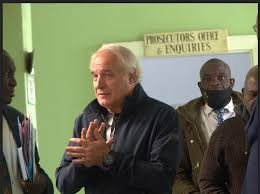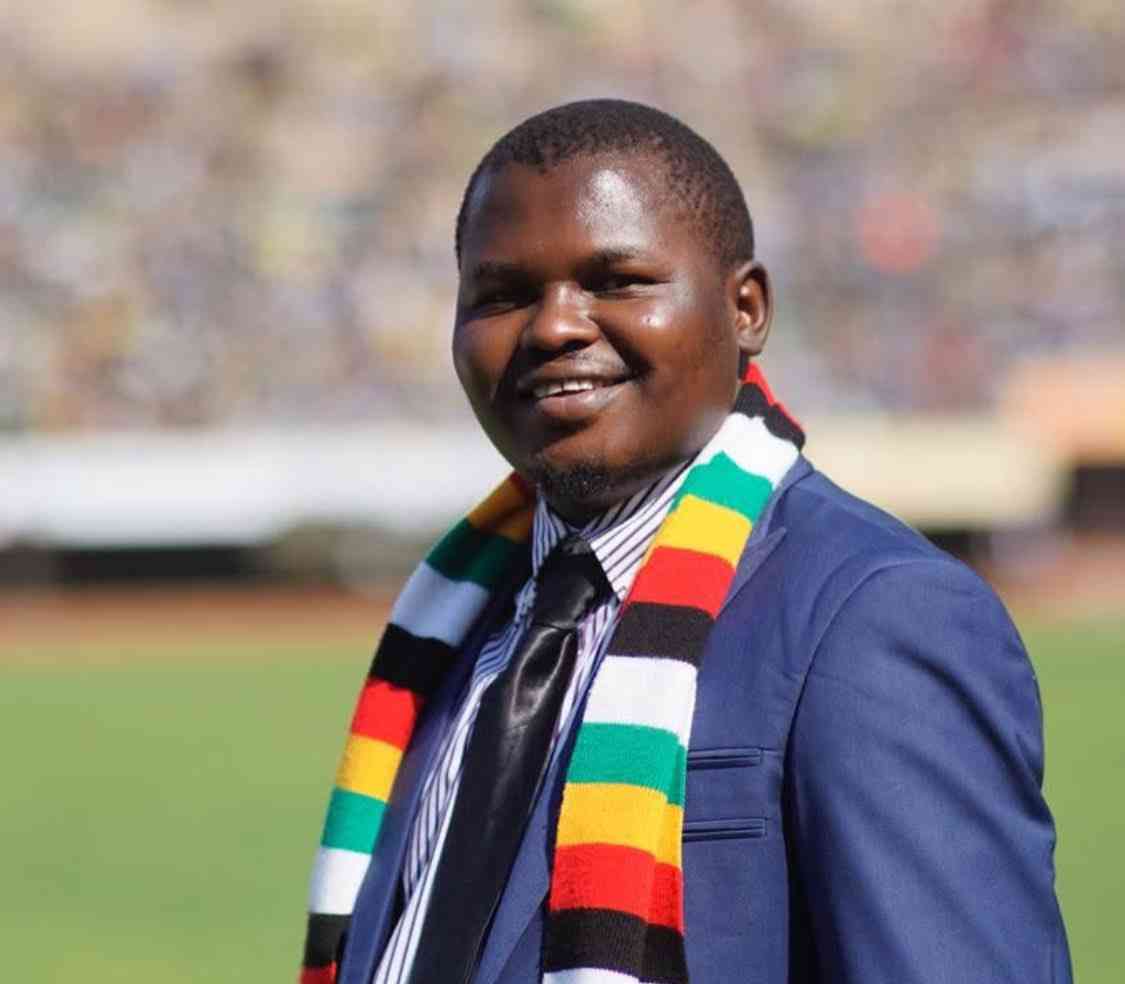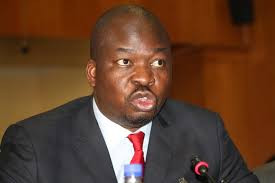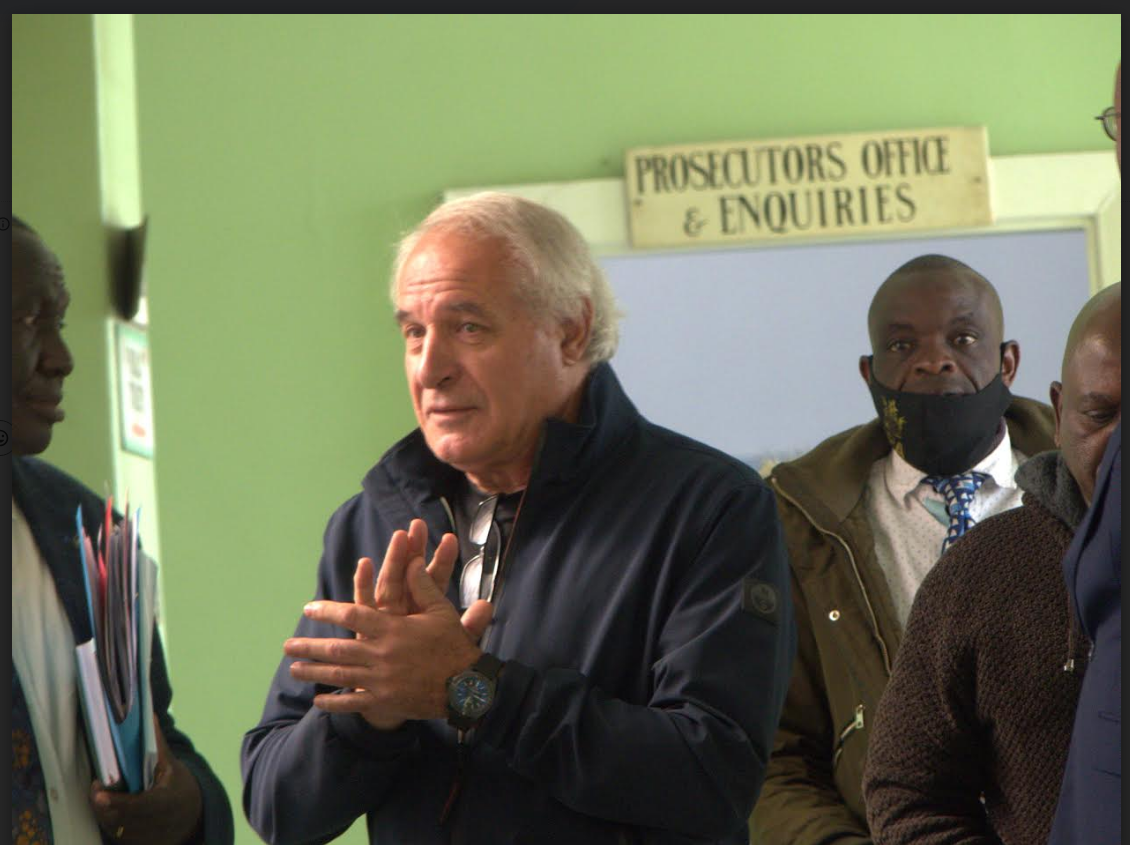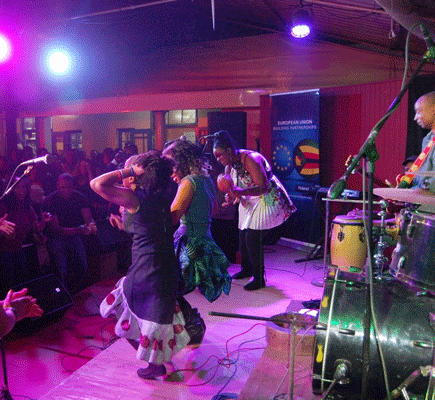
In 1997, I visited for the first time, a Fife Avenue entertainment venue called The Book Café in Harare. There I saw Luck Street Blues, a band comprising Miriam Mandipira (Mumba) on vocals, Paul Brickhill (pictured below) playing the saxophone and David Ndoro on lead guitar. I was informed that The Book Café had become a regular venue for music lovers.
in the groove:with Fred Zindi
The band Luck Street Blues was impressive. It transported its mixed audience through its transcendent live performances through Miriam’s gut-wrenching and breathtaking vocal runs and Brickhill’s passionate sax solos. The soaring instrumentation of the band gave me an emotional connection and magnetism with that venue. I made sure that I would never miss a Saturday again as I became a regular at The Book Café.
The Book Café was originally created by Brickhill in 1993, in order for his band, Luck Street Blues, to have a venue where they would give regular performances..
It also became a platform for free cultural expression in Harare, as it began to operate in partnership with a leading cultural non-governmental organisation, Pamberi Trust, to offer both diverse entertainment to the public at large as well as a space for artistic development, especially a platform for younger up-and-coming artistes. Even established artistes, together with other unknown artistes, were provided with a venue to showcase their talents at The Book Café.
Almost every artiste in Zimbabwe performed at The Book Café — Oliver Mtukudzi, Jah Prayzah, Tariro Ne Gitare, Hope Masike, Diana Samkange, Roki, Afrika Revenge, The Frontline Kids, The Rusike Brothers, The Runn Family, Tanga Wekwa Sando, Andy Brown, Simon Chimbetu, Alick Macheso, Sulumani Chimbetu, John Chibadura, Transit Crew, Alexio Kawara and Chiwoniso Maraire, to mention only a few. Many young artistes started their careers at The Book Café.
According to Brickhill, in the first eight years since the foundation, The Book Café organised 7 500 concerts and events, 650 public debates, 70 book presentations and 35 theatre performances. It also offered the stage to 150 international touring acts.
For instance, on January 22, 2012, there was a free public discussion at The Book Cafe titled Rastafari, Reggae and Dancehall which I was privileged to attend.
- Chamisa under fire over US$120K donation
- Mavhunga puts DeMbare into Chibuku quarterfinals
- Pension funds bet on Cabora Bassa oilfields
- Councils defy govt fire tender directive
Keep Reading
This was hosted by a Jamaican Rastafari scholar and activist Jahlani Niaah, who had been invited to Zimbabwe by the late Thomas Deve and Saki Mafundikwa.
He delivered a scintillating and edifying speech on the connection between Jamaicans and Zimbabwean youth and the influence of Rastafari to the world.
The Book Café was viewed as a free space, a liberated zone, an embassy of change by many of its patrons. It was a hub for artistes — a place to meet, work, network and share ideas. It was also a place of free expression, of entertainment, of generosity.
The Book Café went on to offer a space to eat, to drink to discuss, to enjoy music, theatre, fashion and film. It also became home to The Spoken Word and came alive each and every month with Sistaz Open Mic and the House of Hunger Poetry Slam.
The Book Café was indeed a community arts centre — a space where artistes and the public could meet each other, connect with each other and share ideas and inspiration.
While still at its Fife Avenue location, it expanded to include The Mannenberg, a strictly jazz venue for lovers of that genre of music next door.
In 2011, The Book Café was served with a notice of eviction from its revered Fife Avenue location. From January 1, 2012 it ceased operating in that icon ic space that had become an artistes’ home. The year began amidst ruins, with the daunting task of securing alternative space, re-locating all operations, refurbishing and re-equipping.
At the time, the organisation was reminded of its roots, that it was established in 1981 by war veterans (several engaged in cultural work), it grew out of the struggle initially as Grassroots Books, transformed into The Book Café in 1997, and finally founded Pamberi Trust in 2002 as the development wing of a social enterprise.
Brickhill and Jeremy, his brother, had been war veterans during Zimbabwe’s liberation struggle. Brickhill grew up in Harare during the period in which the liberation war was intensifying rapidly. He refused to serve in the Rhodesian army and escaped from the country to join the liberation struggle in 1976.
He joined Zapu in exile and immediately volunteered to serve in ZPRA, in whose ranks his elder brother, Jeremy, was already serving. During his service in ZPRA intelligence, he undertook many dangerous undercover operations and was a fearless revolutionary cadre.
Following independence in 1980, he began his life-long career promoting culture in Zimbabwe, founding the country’s first progressive bookshop — Grassroots Books — in 1981 and subsequently its associate sister publishing company, Anvil Press.
At the same time, Brickhill pursued his own personal journey as a musician, establishing a series of bands during the 1980s, including the popular Solidarity Band, which featured several young musicians who were destined to find fame as the Bhundu Boys.
His saxophone travelled across the whole country in those years, most usually to be found in the poorer working-class township pubs and clubs. In later years he and legendary jazz guitarist Ndoro founded Luck Street Blues, playing almost 1 000 live shows in the years 1995-2005.
In 1997 Brickhill expanded the original Grassroots Books concept into a multi-dimensional artistic vision involving music, theatre, film, literature, poetry, art and craft and thus was born the world-famous The Book Café.
In 2011 Brickhill received a National Arts Merit Awards gong for “services to the arts” and in 2012 he was awarded a Prince Klaus Award by the government of the Netherlands in recognition of his role in establishing The Book Café and his own life-long commitment to promoting the arts.
The year 2012 turned out to be a period of resilience. In mid-March of that year, a new home which was bigger, central and which offered more scope for expansion was found at 139 Samora Machel Avenue on the corner of Sixth Street in Harare. The opening was heralded by two five-hour concerts.
Staging, technical and venue facilities were upgraded. Impressive progress was made in information dissemination. Several epic arts and social discussions took place. Historic concerts were held in the year, Sulumani breaking The Book Café attendance records, Mtukudzi weaving his magic to full houses, while extraordinary arts collaborations took shape, notably Kunonga with maestro Khoza from South Africa and Chiwoniso with Tumi and The Volume, also from South Africa.
The year ended aptly, with the largest “16 Days Against Gender-based Violence” series of events on record at The Book Café.
Unfortunately, Brickhill was diagnosed with throat cancer in July 2014. He died later that year on October 2. He had made The Book Café Zimbabwe’s busiest and most well-known arts and culture centre.
Efforts to continue with Brickhill’s dreams of keeping The Book Café alive were made by his son, Tomas, but that did not go far as he was overwhelmed by the business. Later on, Spenser Madziwa, another music entrepreneur, also made an effort to continue with Brickhill’s dream, but that did not go far either.
As I drive past an empty shell at 139 Samora Machel Avenue, I keep wondering whether there is nobody with the same dreams as Brickhill to resuscitate The Book Café.
Brickhill had a real vision for the role of arts and culture in Zimbabwe. He understood how important arts and culture are to a people. That is his great legacy. Can anyone help The Book Café rise again?
As Dumiso Dabengwa said in a speech at Brickhill’s funeral: “Stop for one moment and just imagine what would have been achieved if Paul Brickhill had been minister of Arts and Culture in this country! Paul showed us what could be done. He also showed us what needed to be done.”
l Feedback: [email protected]

